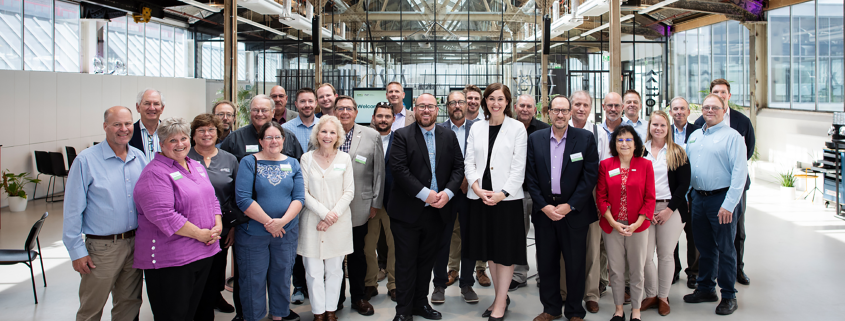Strategizing the St. Lawrence Seaway’s potential: SSGA hosts transportation mission to Netherlands, Belgium
By amplifying the global visibility of the St. Lawrence Seaway, the Specialty Soya and Grains Alliance (SSGA) accomplished a key goal during a first-of-its-kind ag transportation mission to Europe’s largest seaports in Belgium and the Netherlands Sept. 2-6. But a checked box is just a first step in what SSGA has learned in a long, but attainable to-do list ahead.
“What has happened here, is that we’re on the cusp of change,” said Eric Wenberg, executive director of SSGA. “The right people are meeting and talking to each other. This trip is not a trade promotion trip. This is a transportation preference trip. We need to make it clear that the U.S. does have transportation access to these ports and onward to the rest of the world if we need it, but we’re asking the stakeholders to choose a preference from the U.S. and reconsider the Great Lakes.”
Exploring the interconnectivity of commerce
SSGA brought in stakeholders from all over the Midwest, including Wisconsin, Illinois and Minnesota soy checkoff leaders, the Department of Transportation, USDA and Great Lakes St. Lawrence Seaway Development Corporation, to participate in several networking opportunities and tours to discuss the potential benefits of the St. Lawrence Seaway being chosen as the gateway of choice.
“We need supply chain resiliency and redundancy in the Great Lakes St. Lawrence Seaway system,” said Peter Hirthe, international trade specialist with the Great Lakes St. Lawrence Seaway Development Corporation.
Attendees witnessed how industry leaders stay one step ahead at Hutchison Port ECT, recognized as one of Europe’s leading container terminal operators. The terminal utilizes semi-automatic cranes and automated guided vehicles to move containers, enhancing operational efficiency and safety. That followed with a trip to the World Port Center, Samga grain terminal in Belgium and more, giving SSGA and other leaders from the U.S. the opportunity to learn about the interconnectivity of commerce between Europe and the rest of the world.
“From a business development standpoint, success in business development has relied on finding a need. A lot of times the customer doesn’t know what it is they need and what it is that would make it better. Redundancy and resilience-that’s what a lot of our job is going to be, finding the defined needs and coming up with a creative solution,” Gary Williams, SSGA’s director of transportation and regulatory affairs, said.
Joining forces
Through conversations with colleagues and maritime industry leaders from Europe, feelings of optimism grew during the four-day visit.
“The planning of this and the way this was done was extremely unique, but it worked,” said SSGA Chair Bob Sinner. “It’s hard to know who we should have in the room for these types of discussions. To have a room full of logistics providers made sense because they have a lot of companies that export to the U.S. As a shipper, I’m extremely grateful for the understanding of our history and complexities and how difficult freight can be for companies like us.”
U.S. attendees also made it a priority to highlight the importance of the St. Lawrence Seaway at each of the week’s several networking meetings.
“We shared information about the St. Lawrence Seaway, like the fact that it had 99.4% on-time deliveries, that it is very environmentally sustainable and is a direct path to Rotterdam,” said Gail Donkers, who represents MSR&PC on SSGA’s board of directors. “Our trade mission delegation had time to meet with the transportation specialists to discuss our objectives and look at how each company could benefit from shipping goods along the St. Lawrence Seaway as a back haul.”
Finding a route for success
The visit wrapped up with an opportunity for U.S. attendees to gather to brainstorm, reflect and develop a vision for what the next steps entail.
“What we’ve learned on the trip is that there are billions of dollars being invested in infrastructure,” Wenberg said. “Being here to talk to the U.S. administration, and embassy in these ports along with the St. Lawrence Seaway administration means we can continue to target and support the infrastructure developments we need to support the Lakes system.”
For SSGA, this unique mission is only just beginning in further optimizing the St. Lawrence Seaway and will require collaboration from the region to find success.
“It really is a connection to Europe,” Wenberg said. “Sixty percent of the economy of the EU is within 500 miles of these ports in the U.S. If Europe wants to connect with our consumers in Toronto, Canada and Chicago and our eight Great Lakes seaway states, we have to build this trade force together.”







Leave a Reply
Want to join the discussion?Feel free to contribute!